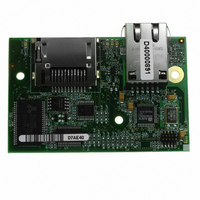20-101-1138 Rabbit Semiconductor, 20-101-1138 Datasheet - Page 47

20-101-1138
Manufacturer Part Number
20-101-1138
Description
RCM4300 RABBITCORE
Manufacturer
Rabbit Semiconductor
Datasheet
1.20-101-1139.pdf
(124 pages)
Specifications of 20-101-1138
Module/board Type
MPU Core Module
Product
Microcontroller Modules
Data Bus Width
8 bit
Core Processor
Rabbit 4000
Clock Speed
58.98 MHz
Interface Type
Ethernet
Flash
2 MBytes
Timers
10 x 8 bit
Operating Supply Voltage
3.3 V
Board Size
72 mm x 47 mm x 21 mm
For Use With/related Products
RCM4300
Lead Free Status / RoHS Status
Lead free / RoHS Compliant
Other names
316-1141
- Current page: 47 of 124
- Download datasheet (2Mb)
5.1 More About Dynamic C
Dynamic C has been in use worldwide since 1989. It is specially designed for program-
ming embedded systems, and features quick compile and interactive debugging. A com-
plete reference guide to Dynamic C is contained in the Dynamic C User’s Manual.
Since the RCM4300 has a serial flash memory, all software development must be done in
the static SRAM. The flash memory and SRAM options are selected with the
Program Options > Compiler
Developing software with Dynamic C is simple. Users can write, compile, and test C and
assembly code without leaving the Dynamic C development environment. Debugging
occurs while the application runs on the target. Alternatively, users can compile a program
to an image file for later loading. Dynamic C runs on PCs on PCs under Windows NT and
later—note that Dynamic C is still being evaluated for compatibility with Windows Vista
at the time of writing, and should not be expected to run correctly under Windows Vista at
this time. Programs can be downloaded at baud rates of up to 460,800 bps after the program
compiles.
RabbitCore RCM4300 User’s Manual
Dynamic C is an integrated development system for writing
embedded software. It runs on an IBM-compatible PC and is
designed for use with single-board computers and other devices
based on the Rabbit microprocessor. Chapter 5 describes the
libraries and function calls related to the RCM4300.
NOTE: An application should be compiled directly to the battery-backed data SRAM on
the RCM4300 module using the Code and BIOS in RAM
option while debugging for faster download times, but should be recompiled to run
from the fast SRAM after the serial programming cable is disconnected. Your final code
must always be stored in flash memory for reliable operation. RCM4300 modules have a
fast program execution SRAM that is not battery-backed. Select
Flash, Run in RAM
menu to store the code in flash and copy it to the fast program execution SRAM at run-
time to take advantage of the faster clock speed. This option optimizes the performance
of RCM4300 modules running at 58.98 MHz.
from the Dynamic C
menu.
5. S
OFTWARE
Options > Project Options > Compiler
R
BIOS
EFERENCE
Code and BIOS in
memory compiler
Options >
47
Related parts for 20-101-1138
Image
Part Number
Description
Manufacturer
Datasheet
Request
R

Part Number:
Description:
COMPUTER SGL-BRD BL2500 29.4MHZ
Manufacturer:
Rabbit Semiconductor
Datasheet:

Part Number:
Description:
COMPUTER SGL-BRD BL2500 29.4MHZ
Manufacturer:
Rabbit Semiconductor
Datasheet:

Part Number:
Description:
DISPLAY GRAPHIC 12KEY PROG OP670
Manufacturer:
Rabbit Semiconductor
Datasheet:

Part Number:
Description:
DISPLAY GRAPHIC 12KEY ETH OP6700
Manufacturer:
Rabbit Semiconductor
Datasheet:

Part Number:
Description:
COMPUTER SINGLE-BOARD BL2030
Manufacturer:
Rabbit Semiconductor

Part Number:
Description:
COMPUTER SGL-BOARD ETH BL2010
Manufacturer:
Rabbit Semiconductor

Part Number:
Description:
MODULE OP6810 W/O ETH/MEM EXPANS
Manufacturer:
Rabbit Semiconductor
Datasheet:

Part Number:
Description:
COMPUTER SINGLE-BOARD BL2020
Manufacturer:
Rabbit Semiconductor

Part Number:
Description:
COMPUTER BL2010 W/FRICTION LOCK
Manufacturer:
Rabbit Semiconductor

Part Number:
Description:
COMPUTER BL2020 W/FRICTION LOCK
Manufacturer:
Rabbit Semiconductor

Part Number:
Description:
COMPUTER SGL-BRD BL2500 44.2MHZ
Manufacturer:
Rabbit Semiconductor
Datasheet:

Part Number:
Description:
COMPUTER SGL-BOARD FULL BL2000
Manufacturer:
Rabbit Semiconductor

Part Number:
Description:
COMPUTER SINGLE-BOARD BL2110
Manufacturer:
Rabbit Semiconductor

Part Number:
Description:
COMPUTER SGL-BRD 29.4MHZ BL2610
Manufacturer:
Rabbit Semiconductor
Datasheet:

Part Number:
Description:
INTERFACE OP6800 512K FLASH&SRAM
Manufacturer:
Rabbit Semiconductor
Datasheet:










